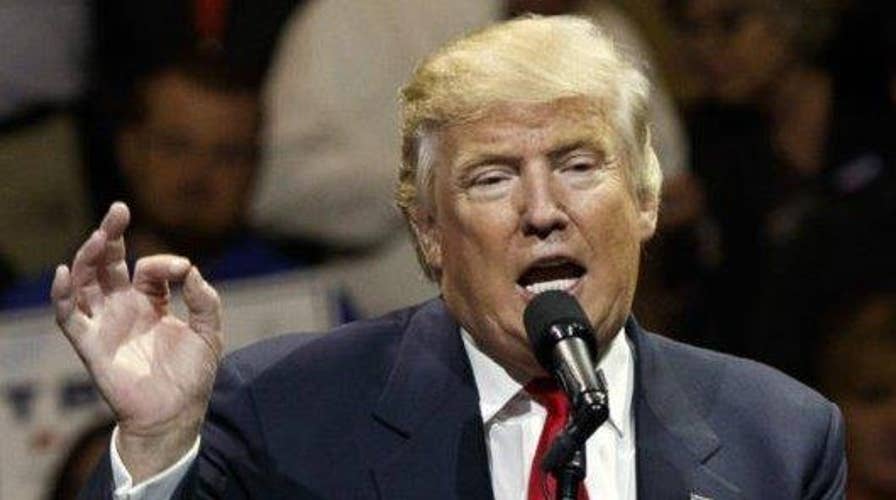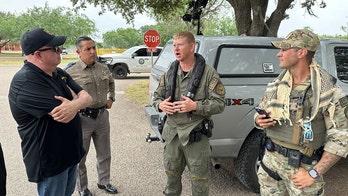President Trump expected to suspend refugee program
Fox News contributors Walid Phares and Pat Caddell react
President Donald Trump will order the U.S. government to stop accepting Syrian refugees and suspend the issuing of visas to people from seven predominantly Muslim countries, according to a draft executive order obtained by the Associated Press Wednesday.
The AP also reported that the draft order shows Trump intends to suspend the United States' broader refugee program for 120 days. Citizens of Iran, Iraq, Libya, Somalia, Sudan, Syria or Yemen would be unable to obtain U.S. visas for at least 30 days.
Trump is expected to sign the order this week. It was not clear if the draft will be revised before then.
According to the AP, Trump's draft shows that he will order Homeland Security and State Department officials, along with the director of national intelligence, to review what information the government needs to fully vet would-be visitors and come up with a list of countries that don't provide it. The order says the government will give countries 60 days to start providing the information or citizens from those countries will be barred from traveling to the United States.
Exceptions would be made for diplomats, NATO visas or those people traveling to work at the United Nations.
During the campaign Trump, said vetting procedures were inadequate and suggested that terrorists could pose as Syrian refugees to infiltrate the United States.
While suspending visas for Syrians, Trump is also asking that officials from the departments of State and Defense to draft plans for safe zones in and around Syria.
Trump has the authority to determine how many refugees are accepted annually and he can suspend the program at any time. Refugee processing was suspended in the immediate aftermath of the Sept. 11 attacks, restarting months later.
During the last budget year, the U.S. accepted 84,995 refugees, including 12,587 people from Syria and President Barack Obama had set the refugee limit for this budget year at 110,000.
Trump, according to his yet-to-be-signed executive order, will cut that program by more half to 50,000. The order said while the program is suspended, the U.S. may admit people on a case-by-case basis "when in the national interest" and the government would continue to process refugee requests from people claiming religious persecution, "provided that the religion....is a minority religion in the individual's country." That suggests that would allow the admission of Christians from Muslim-majority countries.
Earlier Wednesday, Trump issued orders aimed at moving ahead with a wall on the Mexican border and blocking federal funds from "sanctuary cities" that protect immigrants.
“A nation without borders is not a nation,” Trump declared after signing the measures, while speaking to employees at the Department of Homeland Security. “Beginning today, the United States of America gets back control of its borders.”
The first order calls for the “immediate construction of a physical wall on the southern border,” and directs the DHS secretary to take “all appropriate steps to immediately plan, design, and construct” the wall using authority under existing law.
While it’s not yet clear exactly how the project might be funded or how much it would cost, Trump reiterated his vow that Mexico “absolutely” will pay for the project eventually, something the Mexican government has denied.
“Ultimately it will come out of what’s happening with Mexico,” Trump told ABC News in a separate interview, adding construction could begin in a matter of months.
Mexican President Enrique Pena Nieto said Wednesday night that he "regrets and disapproves'' the push by Trump to build a new wall along the U.S.-Mexico border.
Pena Nieto did not say whether or not he will attend a summit with Trump in Washington that the White House said would take place on Tuesday.
Mexico’s contribution aside, Press Secretary Sean Spicer said existing Homeland Security funding could be used for now to get started, and congressional appropriations eventually would be needed. The order itself calls for the preparation of congressional budget requests.
The same executive order also calls for hiring 5,000 more Border Patrol agents and ending “catch-and-release” policies for illegal immigrants, among other provisions.
Another order is aimed at helping federal immigration agents. It calls for hiring 10,000 additional officers; restoring the so-called Secure Communities program and other local partnerships; prioritizing the deportation of illegal immigrant criminals; directing the State Department to use leverage to ensure illegal immigrants are taken back by their country of origin – and moving to strip federal grant money to sanctuary states and cities that “harbor” illegal immigrants.
The Associated Press contributed to this report.





